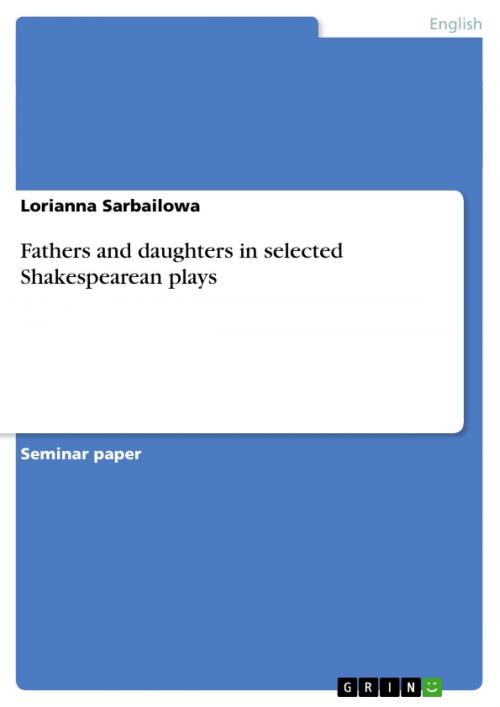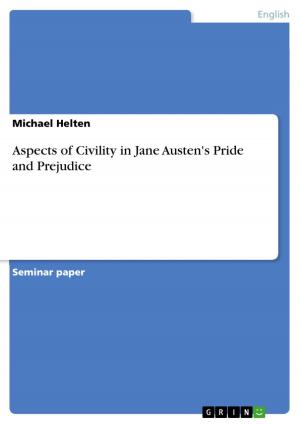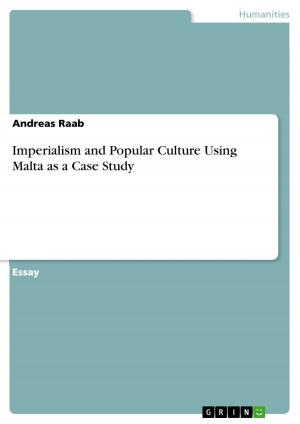Fathers and daughters in selected Shakespearean plays
Fiction & Literature, Literary Theory & Criticism, British| Author: | Lorianna Sarbailowa | ISBN: | 9783640505807 |
| Publisher: | GRIN Publishing | Publication: | January 8, 2010 |
| Imprint: | GRIN Publishing | Language: | English |
| Author: | Lorianna Sarbailowa |
| ISBN: | 9783640505807 |
| Publisher: | GRIN Publishing |
| Publication: | January 8, 2010 |
| Imprint: | GRIN Publishing |
| Language: | English |
Seminar paper from the year 2009 in the subject English Language and Literature Studies - Literature, grade: 2, University of Cologne, language: English, abstract: Introduction Though the impression that numerous Shakespearean plays on fathers and daughters are very similar to each other is awaken, however this is not true. Many plays depict the same situations with similar circumstances, still it is a great fallacy to suppose that there is only few variation. Indisputably each play has different essential themes, different focus and particulars. Many elements seem similar or actually are really similar, however Shakespeare's subtle works are nevertheless unique and ingenious - each peace of work its own way. Among Shakespeare's tragedies and comedies there are a lot of plays in which the relationship between parents with their children is focussed. Particularly interesting is the relationship between fathers and daughters as it is most controversial. Shakespeare destines most of the father- daughter pairs to fail. Usually the father proves to be inept and incapable as he neither knows his own child's nature, nor is he able or willing to get to know her. His paternal authority does not allow him to descent on his daughter's level and make an attempt to understand her will and her needs. All the inept fathers of the further discussed plays undergo punishment - the death, either his daughter's or his own or both die. On that account he can be empathised with, of course, but yet it is often his lack of wisdom which results in a tragedy. Most of Shakespearian daughters are rebels who contradict their father's word and will. Obedience is every daughter's main duty and those who make an exception to the rule are definitely just as incapable daughters. However in comedies it is perfectly legitimate for a daughter to make her own choices and still be happy. Whereas in tragedies Shakespeare is not very generous with his heroines and does not bestow them such a lucky lot - pretty much as their fathers. The present essay consists of two parts. The first chapter concentrates especially on the father figures and the second one on their daughters. The selection of the works is undertaken according to the plots in which the interaction between fathers and daughters is central. In this essay following plays are analysed in detail: Romeo and Juliet, Othello, the Moor of Venice, King Lear, Hamlet, Prince of Denmark, A Midsummer Night's Dream and The Tempest. Six various father-daughter constellations arise from the four tragedies and two comedies.
Seminar paper from the year 2009 in the subject English Language and Literature Studies - Literature, grade: 2, University of Cologne, language: English, abstract: Introduction Though the impression that numerous Shakespearean plays on fathers and daughters are very similar to each other is awaken, however this is not true. Many plays depict the same situations with similar circumstances, still it is a great fallacy to suppose that there is only few variation. Indisputably each play has different essential themes, different focus and particulars. Many elements seem similar or actually are really similar, however Shakespeare's subtle works are nevertheless unique and ingenious - each peace of work its own way. Among Shakespeare's tragedies and comedies there are a lot of plays in which the relationship between parents with their children is focussed. Particularly interesting is the relationship between fathers and daughters as it is most controversial. Shakespeare destines most of the father- daughter pairs to fail. Usually the father proves to be inept and incapable as he neither knows his own child's nature, nor is he able or willing to get to know her. His paternal authority does not allow him to descent on his daughter's level and make an attempt to understand her will and her needs. All the inept fathers of the further discussed plays undergo punishment - the death, either his daughter's or his own or both die. On that account he can be empathised with, of course, but yet it is often his lack of wisdom which results in a tragedy. Most of Shakespearian daughters are rebels who contradict their father's word and will. Obedience is every daughter's main duty and those who make an exception to the rule are definitely just as incapable daughters. However in comedies it is perfectly legitimate for a daughter to make her own choices and still be happy. Whereas in tragedies Shakespeare is not very generous with his heroines and does not bestow them such a lucky lot - pretty much as their fathers. The present essay consists of two parts. The first chapter concentrates especially on the father figures and the second one on their daughters. The selection of the works is undertaken according to the plots in which the interaction between fathers and daughters is central. In this essay following plays are analysed in detail: Romeo and Juliet, Othello, the Moor of Venice, King Lear, Hamlet, Prince of Denmark, A Midsummer Night's Dream and The Tempest. Six various father-daughter constellations arise from the four tragedies and two comedies.















